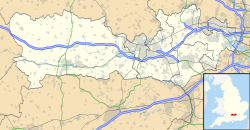| RAF Staff College, Bracknell | |
|---|---|
| Ramslade House, Bracknell, Berkshire in England | |
 Ramslade House in 2015 prior to demolition. The building was home to the RAF Staff College, Bracknell. | |
 | |
| Site information | |
| Type | Staff college |
| Owner | Ministry of Defence |
| Operator | Royal Air Force |
| Condition | Closed |
| Location | |
Location in Berkshire | |
| Coordinates | 51°24′32″N0°44′28″W / 51.4089°N 0.7411°W |
| Site history | |
| Built | 1840 |
| In use | 1945–1997 |
| Fate | Joint Services Command and Staff College established at the site, which later moved to MOD Shrivenham. The site was subsequently sold for redevelopment in 2004. |
The RAF Staff College at Bracknell was a Royal Air Force staff college active for most of the second half of the 20th century. Its role was the training of staff officers in the administrative, staff and policy aspects of air force matters. Its motto was Visu et Nisu which is Latin for by vision and effort. The equivalent in the British Army was the Staff College, Camberley and the equivalent in the Royal Navy was the Royal Naval Staff College, Greenwich.
